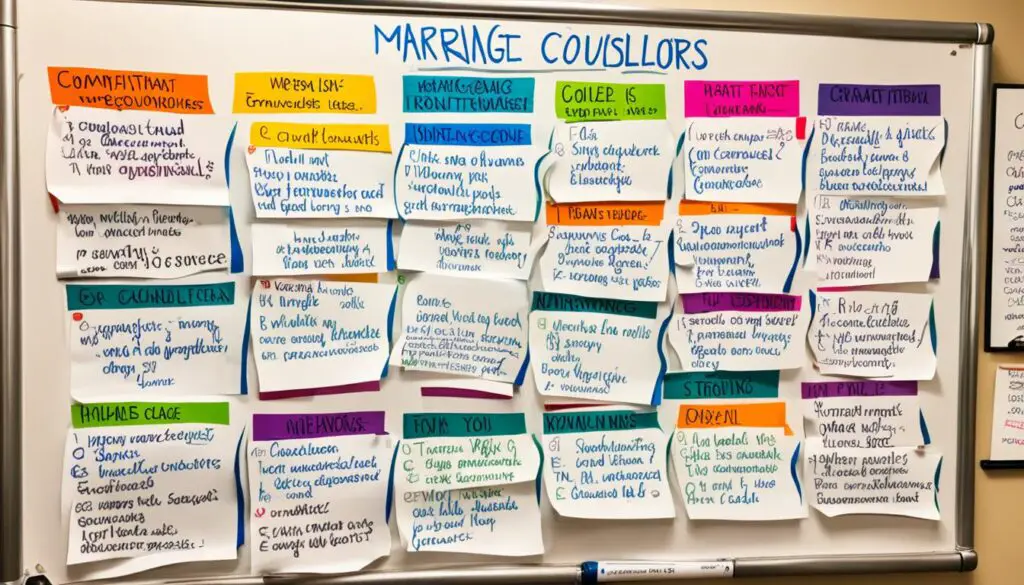If you find yourself unable to communicate with your spouse, seeking marriage counseling can be a helpful way to revitalize your marriage. Marriage counseling can address issues such as financial concerns, life changes, stress, disagreements, and communication breakdowns. In this article, we’ll explore tips for couples counseling, marriage counseling questions, and support for dating or premarital counseling.
Key Takeaways:
- Asking for guidance in marriage can help revitalize your relationship and address various issues.
- Marriage counseling can provide support for financial concerns, life changes, stress, disagreements, and communication breakdowns.
- Couples counseling, marriage counseling questions, and dating or premarital counseling are all avenues for guidance and support in marriage.
How to Prepare for Couples Counseling
Preparing for your first couples counseling session is an important step towards improving your relationship. By taking the time to adequately prepare, you and your partner can make the most out of your counseling experience. Here are some tips to help you get ready:
- Be Open-Minded: Approach couples counseling with an open mind and a willingness to seek help. This will allow you to fully engage in the therapy process and benefit from the tools and guidance provided by your counselor.
- Discuss Shared Goals: Before your first session, have a conversation with your partner about your shared goals for counseling. This will help you align your expectations and ensure you’re working towards common objectives.
- Set Realistic Expectations: Couples counseling takes time and effort, so it’s important to set realistic expectations. Understand that change won’t happen overnight, and be prepared to commit to the process for the long term.
- Identify Feelings and Assumptions: Take some time to reflect on your own feelings and assumptions about your relationship. Consider the issues you’d like to address in counseling and any underlying emotions that may be contributing to the challenges you’re facing.
Additionally, finding a qualified therapist who meets your needs is crucial for a successful counseling experience. Take the time to research therapists in your area, read reviews, and consider their expertise in couples counseling. A good fit between you, your partner, and your therapist is essential for productive sessions.
Remember, couples counseling is a collaborative process, and your active participation is key to its success. By adequately preparing for your first session, you and your partner can embark on a journey towards a healthier and more fulfilling relationship.
| Advantages of Preparing for Couples Counseling |
|---|
| Improved Focus: Preparing beforehand helps you and your partner stay focused on the issues you want to address during your sessions. |
| Efficient Use of Time: Being prepared allows you to make the most out of your counseling sessions, maximizing the time spent with your therapist. |
| Enhanced Communication: Preparing for couples counseling encourages open communication between you and your partner, promoting honesty and understanding. |
| Increased Accountability: Taking the time to prepare demonstrates your commitment to the counseling process and reinforces accountability for personal growth. |
What Questions Do Marriage Counselors Ask At the Beginning?
At the start of marriage counseling, therapists often ask couples to share their stories, values, and expectations. These questions help the therapist better understand the dynamics of the relationship and any concerns the couple may have. Discussing what each partner values about the relationship and their individual interpretations of marriage is also important. These initial questions lay the foundation for productive counseling sessions.
Creating a Safe Space for Couples
Marriage counselors prioritize creating a safe and non-judgmental environment where couples can express themselves openly. The initial questions asked by therapists allow couples to share their experiences, hopes, and fears, fostering trust and transparency in the counseling process.
“Marriage counseling is a collaborative journey where couples explore their thoughts and emotions. The questions we ask help us understand their unique perspectives and work towards meaningful solutions.”
– Dr. Sarah Evans, Licensed Marriage and Family Therapist
In the beginning, counselors often ask about the couple’s relationship history, including how they met, significant milestones, and challenges they have faced together. This helps therapists gain insight into the couple’s journey and the factors that have shaped their relationship.
Understanding Values and Expectations
Marriage counseling involves exploring the values and expectations that each partner holds in the relationship. Therapists ask couples about their individual understandings of marriage and what they hope to achieve through counseling. This conversation allows couples to align their goals and make informed decisions about their partnership.
“The early conversations we have in counseling pave the way for long-term success. By understanding each partner’s values and expectations, we can bridge any gaps and foster a stronger connection.”
– Dr. David Thompson, Couples Therapist
During these discussions, counselors may inquire about the couple’s vision of a successful marriage and the specific areas they would like to improve. This helps therapists tailor their counseling approach to the couple’s unique needs.
Setting the Stage for Productive Counseling
The initial questions asked by marriage counselors lay the foundation for productive counseling sessions. By understanding the couple’s story, values, and expectations, therapists can guide them towards exploring and addressing underlying issues.
Through these conversations, counselors can identify potential areas of conflict, communication breakdowns, or unresolved past experiences that need attention. By addressing these root causes early on, couples can work collaboratively with their therapist to develop effective strategies for healing and growth.
To summarize, the questions asked by marriage counselors at the beginning of counseling sessions serve to create a safe space for couples to share their experiences and expectations. These questions lay the groundwork for productive sessions by fostering trust, revealing key insights, and identifying areas for growth. By addressing these foundational aspects, couples can embark on their counseling journey with clarity and purpose.
| Common Questions Asked by Marriage Counselors | Purpose |
|---|---|
| What is your relationship history? | Gain insight into the couple’s journey and milestones. |
| What do you value about your relationship? | Understand each partner’s perspective and what is important to them. |
| What are your expectations for counseling? | Align goals and establish a shared understanding of the counseling process. |
| What is your vision of a successful marriage? | Explore the couple’s aspirations and identify areas for growth. |

What to Say in Marriage Counseling
In marriage counseling, effective communication plays a vital role in resolving conflicts and restoring the relationship. It is essential for couples to have open and honest conversations with each other, creating a safe space for understanding and growth.
Here are some key strategies to enhance communication in marriage counseling:
- Ask tough questions: Marriage counseling provides an opportunity to address difficult issues. By asking challenging questions, couples can explore underlying concerns and gain a deeper understanding of each other’s perspectives.
- Express feelings without accusations: It’s important to communicate emotions without blaming or criticizing the other person. Using “I” statements can help express personal feelings and avoid escalating conflicts.
- Utilize effective communication techniques: Active listening, empathy, and validation are essential in marriage counseling. These techniques foster understanding and promote constructive dialogue between partners.
- Revisit past discussions: Outside of counseling sessions, couples should revisit previous discussions and reflect on the progress made. This reflection allows for continued growth and the opportunity to address any unresolved concerns.

Effective communication is the cornerstone of a healthy and thriving marriage. It empowers couples to express their needs, understand each other’s perspectives, and ultimately work together towards resolution and restoration.
By implementing these strategies and actively participating in marriage counseling sessions, couples can work towards resolving conflicts, deepening their connection, and fostering a more fulfilling partnership.
How Can I Make My Marriage Counseling More Effective?
When it comes to marriage counseling, a proactive approach can significantly improve the experience for both partners. By focusing on clear communication and addressing issues openly, couples can enhance the effectiveness of their counseling sessions.
Here are some tips to make your marriage counseling more effective:
- Share Your Desires and Objectives: Be proactive in expressing your needs and goals for the counseling process. This will help you and your partner align your expectations and work towards common objectives.
- Avoid Personal Sacrifices: While compromise is important in a marriage, avoid sacrificing your own needs or desires solely for the sake of the relationship. Effective counseling involves finding a healthy balance between individuality and partnership.
- Support Each Other’s Passions: Encourage and support your partner’s interests and passions outside of the relationship. This kind of support fosters personal growth, which can positively impact the marriage.
- Resolve Conflicts Skillfully: Use effective conflict resolution techniques to address disagreements in a productive and respectful manner. This includes active listening, empathy, and finding mutually beneficial solutions.
- Establish Open-Ended Dialogue: Foster an environment of open communication where both partners feel comfortable expressing their thoughts and emotions. This encourages deeper understanding and connection in the counseling process.
- Agree on Financial Management: Discuss and agree upon financial goals and responsibilities within the marriage. This helps create a sense of stability and reduces potential sources of conflict.
- Find Balance in Time Together and Space Apart: Strive for a balance between quality time spent together and individual time for personal growth and self-care. This balance promotes a healthy and fulfilling relationship.
By implementing these strategies, couples can enhance the effectiveness of their marriage counseling experience and work towards building a stronger, more fulfilling relationship.
Image:

Why Timing Matters in Marriage Counseling
The timing of seeking marriage counseling is crucial for its effectiveness. Many couples often wait too long before reaching out for help, allowing resentment to build over time. It’s important to address issues early on and not avoid conflict, as unresolved problems can escalate and damage the relationship further. By seeking counseling sooner, couples have a better chance of resolving their differences and improving their overall relationship.
According to studies, couples wait an average of six years before seeking marriage counseling, during which time issues can become deeply ingrained and harder to resolve. Waiting too long may lead to a breakdown in communication and emotional disconnect, making it more challenging to rebuild trust and intimacy.
When should you consider marriage counseling? It’s important to trust your instincts and recognize when your relationship needs assistance. Here are some signs that indicate the need for counseling:
- Constant conflicts and arguments that seem impossible to resolve.
- A lack of effective communication and emotional connection.
- One or both partners contemplating separation or divorce.
- Infidelity or breach of trust.
- Significant life changes that are affecting the relationship, such as a job loss or the birth of a child.
By seeking marriage counseling in a timely manner, couples can address these issues before they worsen and find healthier ways to navigate their challenges. It provides a safe space to express emotions, reestablish trust, and learn effective communication and conflict resolution skills.
Remember, reaching out for help is a sign of strength and a commitment to improving your relationship. Marriage counseling can equip you and your partner with the necessary tools and strategies to overcome hurdles, reignite your connection, and build a stronger, more fulfilling relationship.
“Timing is everything. If you’re having problems, don’t wait. Get help as soon as possible.”
– Dr. Michelle Santos, Licensed Marriage and Family Therapist

| Signs that indicate the need for marriage counseling |
|---|
| Constant conflicts and arguments |
| A lack of effective communication and emotional connection |
| Contemplation of separation or divorce |
| Infidelity or breach of trust |
| Significant life changes impacting the relationship |
Building a Strong Foundation: Commitment, forgiveness, respect
Building a strong foundation in a marriage is essential for its longevity and success. This foundation is built upon three core elements: commitment, forgiveness, and respect. Let’s explore how each of these elements contributes to a strong and thriving marriage.
Commitment: Commitment is the bedrock of a healthy marriage. It involves making the relationship a priority and being willing to work through challenges together. When both partners are fully committed to their marriage, they are more likely to weather the storms that come their way, staying dedicated to their vows and promises.
Forgiveness: Forgiveness plays a crucial role in maintaining a harmonious relationship. Holding grudges and resentments can create a toxic environment, hindering the growth and development of the marriage. By practicing forgiveness, both partners can let go of past hurts and move forward together, fostering healing and growth.
Respect: Respect is the cornerstone of any healthy relationship. It involves accepting and honoring each other’s individuality, opinions, and needs. When both partners respect one another, they create a safe and supportive environment where both feel valued and appreciated. Respect also entails giving each other the space and freedom to grow and pursue individual passions.
In summary, building a strong foundation in a marriage requires commitment, forgiveness, and respect. By prioritizing the relationship, practicing forgiveness, and fostering mutual respect, couples can lay the groundwork for a lasting and fulfilling partnership.

Infusing Romance and Communication in Everyday Life
Infusing romance and communication into daily life is essential for keeping the spark alive in a marriage. By prioritizing these aspects, couples can deepen their connection and maintain a strong and fulfilling relationship. Here are some practical tips to help you infuse romance and communication into your everyday life:
Express Appreciation and Love
To nurture romance in your marriage, express appreciation and love for your spouse regularly. Take a moment each day to acknowledge their efforts, let them know how much you value them, and express gratitude for the little things they do.
Engage in Small Gestures of Love
Small gestures can have a big impact on keeping the romance alive. Surprise your partner with their favorite treat, leave sweet notes for them to find, or plan a spontaneous date night. These small acts of love show your partner that you are thinking of them and help maintain a sense of excitement in the relationship.
Make Time for Quality Time
In the hustle and bustle of daily life, it’s important to carve out dedicated quality time for each other. Whether it’s a weekly date night or simply spending uninterrupted time together, prioritize connecting and engaging in activities that you both enjoy. This focused time strengthens your bond and allows for meaningful communication.
Communicate Openly and Honestly
Effective communication is the foundation of a healthy marriage. Make a conscious effort to communicate openly and honestly with your spouse. Share your feelings, interests, and frustrations, and encourage your partner to do the same. Through active listening and understanding, you can foster intimacy and resolve any issues that may arise.
“Communication is the key to a successful marriage. By sharing our thoughts and emotions openly, we can stay connected and navigate any challenges that come our way.” – John Smith
Foster Intimacy Through Active Communication
In addition to discussing day-to-day matters, engage in deeper conversations that promote emotional intimacy. Take the time to talk about your dreams, aspirations, and future goals as a couple. By delving into each other’s inner worlds, you can strengthen your connection and create a solid foundation for your relationship.
Remember, infusing romance and communication into everyday life requires consistent effort from both partners. By prioritizing these aspects, you can keep the spark alive and enjoy a fulfilling and lasting marriage.
| Benefits of Romance and Communication in Marriage | Ways to Infuse Romance and Communication |
|---|---|
| 1. Increased emotional intimacy | 1. Express appreciation and love |
| 2. Strengthened bond and connection | 2. Engage in small gestures of love |
| 3. Enhanced problem-solving abilities | 3. Make time for quality time |
| 4. Reduced conflicts and misunderstandings | 4. Communicate openly and honestly |
| 5. Increased overall relationship satisfaction | 5. Foster intimacy through active communication |
Overcoming Differences and Conflict
Resolving differences and managing conflict is crucial for a healthy and thriving marriage. Every couple faces disagreements and challenges, but it’s how they handle them that determines the strength of their relationship. By creating a relaxed and open atmosphere, couples can effectively communicate their desires and objectives, fostering understanding and compromise.
Instead of making personal sacrifices, partners should encourage and support each other’s passions and interests. This not only strengthens the individual bond but also adds depth and richness to the marriage. It’s important to remember that resolving conflicts skillfully is an ongoing process. Instead of falling into the blame game, couples should focus on finding common ground and mutually beneficial solutions.
Change takes time, and it’s essential to be realistic about the expectations. Patience, empathy, and understanding play vital roles in overcoming differences and building a stronger marriage. By remaining committed to growth and development, couples can foster a harmonious relationship that stands the test of time.
Remember, every disagreement is an opportunity for growth and understanding. Embrace the challenges as a chance to deepen your connection and work towards a more fulfilling, love-filled marriage.
Benefits of Overcoming Differences and Conflict
“In the midst of conflict, when tensions are high, it can be easy to lose sight of the benefits that come from resolving differences. By overcoming conflicts, couples can experience:
- Enhanced communication and understanding
- Improved emotional intimacy
- Stronger trust and commitment
- Increased empathy and compassion
- Greater personal growth and self-awareness
- A solid foundation for future challenges”
Resolving differences and managing conflict is not only vital for the present but also sets the stage for a happy and fulfilling future together.
Image:
| Conflict Resolution Strategies | Benefits |
|---|---|
| Active listening | Enhanced understanding and empathy |
| Identifying shared goals | Improved teamwork and cooperation |
| Using “I” statements | Reduced defensiveness and blame |
| Seeking compromise | Strengthened partnership and collaboration |
| Seeking professional help | Guidance and support for complex issues |
Conclusion
Marriage counseling is an effective avenue for couples who are willing to invest in the health and longevity of their relationship. By seeking help early on and choosing a qualified therapist, couples increase their chances of experiencing positive outcomes. However, commitment and open communication are essential for successful counseling sessions.
In order to build a strong foundation, couples need to prioritize their commitment to each other. This means facing challenges head-on and working through them together. Forgiveness and respect are also crucial components of a lasting marriage, as they allow couples to move forward and embrace each other’s individuality.
Infusing romance and communication into everyday life is another key aspect of maintaining a healthy relationship. Small gestures of love and quality time together can keep the spark alive. Additionally, open dialogue and realistic expectations contribute to overcoming differences and managing conflict skillfully.
Marriage counseling provides a safe and supportive environment where couples can address their issues and work towards a healthier relationship. By embracing the effectiveness of counseling, committing to open communication, and prioritizing their connection, couples can navigate the challenges of marriage together and build a strong and fulfilling partnership.
FAQ
How can I prepare for couples counseling?
To prepare for couples counseling, it’s important to be open-minded and willing to seek help. Discuss shared goals with your partner and set realistic expectations for counseling. Identifying your own feelings and assumptions beforehand can also be helpful. Finally, find a qualified therapist who meets your needs.
What questions do marriage counselors ask at the beginning?
Marriage counselors often ask couples to share their stories, values, and expectations at the beginning of counseling. They may also ask about what each partner values in the relationship and their individual interpretations of marriage. These questions help the counselor better understand the dynamics and concerns of the relationship.
What should I say in marriage counseling?
In marriage counseling, it’s important to have open and honest conversations with your spouse. Couples should ask tough questions, express their feelings without accusations, and use effective communication techniques. It’s also beneficial to revisit past discussions outside of counseling and address any concerns in future sessions.
How can I make my marriage counseling more effective?
To make marriage counseling more effective, couples should be proactive in sharing their desires and objectives. They should avoid making personal sacrifices for the relationship and support each other’s passions. Resolving conflicts skillfully and establishing an open-ended dialogue are also important. Agreeing on financial management and finding a balance between spending time together and giving each other space can enhance the effectiveness of counseling.
Why does the timing matter in marriage counseling?
The timing of seeking marriage counseling plays a significant role in its effectiveness. Couples often wait too long before reaching out for help, allowing resentment to build for an average of six years. It’s important to address issues early on and not avoid conflict. By seeking counseling sooner, couples have a better chance of resolving their differences and improving their relationship.
How can I build a strong foundation in my marriage?
Building a strong foundation in a marriage requires commitment, forgiveness, and respect. Couples should commit to making their relationship a priority and be willing to work through challenges. Forgiveness allows both partners to move forward and avoid holding grudges. Respect involves accepting one another’s individuality and giving each other room to grow. These elements contribute to the strength and longevity of a marriage.
How can I infuse romance and communication into my marriage?
Infusing romance and communication into daily life helps keep the spark alive in a marriage. Couples can rekindle romance by expressing appreciation for each other, engaging in small gestures of love, and making time for date nights or quality time together. Active communication about feelings, interests, and frustrations fosters intimacy and strengthens the relationship.
How can I overcome differences and manage conflict in my marriage?
Overcoming differences and managing conflict is essential for a healthy marriage. Couples should create a relaxed atmosphere to communicate openly about desires and objectives. It’s important to avoid personal sacrifices and instead support each other’s passions. Learning to resolve conflicts skillfully, avoiding the blame game, and being realistic about the time it takes for change all contribute to overcoming differences and building a stronger marriage.
When is the best time to seek marriage counseling?
Marriage counseling can be effective when both partners are motivated and seek help early on. Choosing a qualified therapist and maintaining open communication are key factors in successful counseling. Building a strong foundation through commitment, forgiveness, and respect is crucial for a long-lasting marriage. Infusing romance and communication into everyday life helps keep the relationship strong. Overcoming differences and managing conflict requires open dialogue and realistic expectations. Marriage counseling can provide a safe space for couples to address their issues and work towards a healthier relationship.









